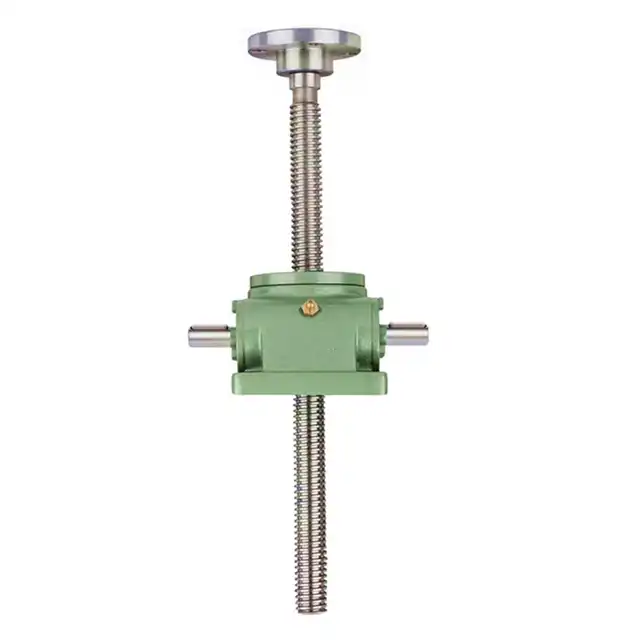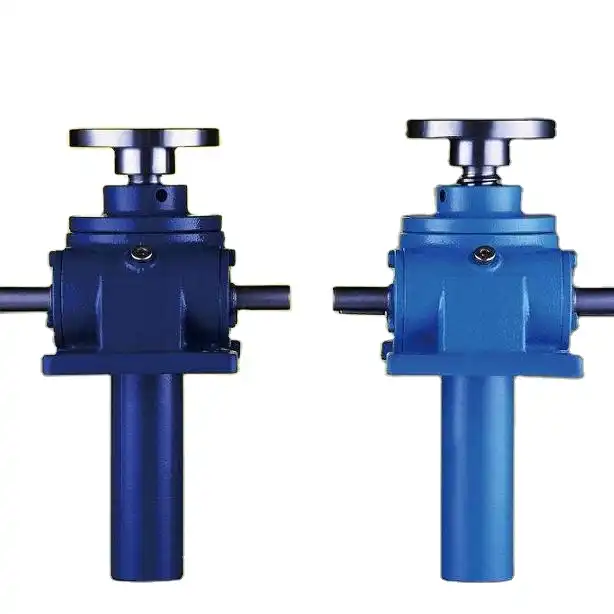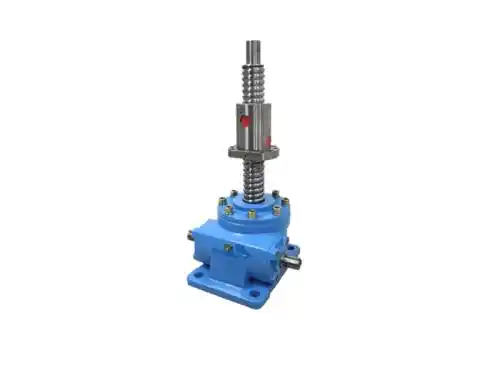
What role do screw jacks play in the precision of assembly line operations?
Screw jacks play a crucial role in ensuring the precision of assembly line operations. They are widely used in manufacturing and assembly processes where accurate positioning, alignment, and control are essential. Here’s how screw jacks contribute to the precision of assembly line operations:
- Precise Positioning: Screw jacks provide precise and controlled linear motion, allowing for accurate positioning of components, parts, or tools on the assembly line. The screw mechanism of the screw jack enables fine adjustments with high positional accuracy, ensuring that each component is correctly placed and aligned according to the required specifications.
- Height Adjustment: Screw jacks are commonly used for height adjustment applications in assembly lines. They allow for easy and precise vertical movement, enabling operators to align workstations, fixtures, or equipment at the optimal height for efficient assembly operations. The ability to fine-tune the height with screw jacks ensures ergonomic working conditions and promotes worker comfort and productivity.
- Load Handling: Screw jacks have the capability to handle a wide range of loads, from light to heavy. This makes them suitable for assembly line operations that involve different types of components or equipment with varying weights. By providing reliable load support and stability, screw jacks contribute to the precision of assembly line operations by ensuring that the load is properly supported and aligned during the assembly process.
- Force Control: Screw jacks offer precise force control capabilities, allowing operators to apply consistent and controlled forces during assembly operations. This is particularly important for tasks that require delicate handling or specific force requirements, such as tightening bolts, fastening components, or applying pressure for proper fitment. The force control provided by screw jacks helps maintain the required precision and avoids overloading or damaging the assembly components.
- Synchronization: In assembly line operations that involve multiple workstations or moving parts, screw jacks can be synchronized to ensure coordinated movement. By mechanically or electrically linking the screw jacks together, they can

How do manufacturers ensure the durability and longevity of screw jacks?
Manufacturers employ various strategies and design considerations to ensure the durability and longevity of screw jacks. These measures aim to enhance the structural integrity, reliability, and resistance to wear and tear. Here are some key approaches manufacturers use to ensure the durability and longevity of screw jacks:
- High-Quality Materials: Manufacturers use high-quality materials in the construction of screw jacks to enhance their durability. Components such as screws, nuts, housing, bearings, and load-bearing parts are often made from materials such as hardened steel alloys or other durable metals. These materials offer excellent strength, resistance to deformation, and robustness, ensuring that the screw jacks can withstand heavy loads and prolonged use.
- Surface Treatments: Surface treatments and coatings are applied to screw jack components to improve their resistance to corrosion, abrasion, and wear. Common surface treatments include electroplating, powder coating, or applying specialized protective coatings. These treatments provide a layer of defense against environmental factors, such as moisture, chemicals, or abrasive particles, which can degrade the components and compromise the longevity of the screw jacks.
- Precision Manufacturing: Precision manufacturing processes are employed to ensure the accurate fabrication of screw jacks. Tight tolerances and meticulous machining techniques are utilized to achieve proper fit and alignment of components. This precision manufacturing minimizes mechanical play, reduces friction, and optimizes the overall performance of the screw jacks, contributing to their durability and longevity.
- Load Capacity and Safety Margins: Manufacturers carefully determine the load capacity of screw jacks and incorporate safety margins to ensure their long-term durability. By specifying load capacities that exceed the expected maximum loads, manufacturers provide a safety buffer that prevents the screw jacks from operating near their limits. This approach minimizes stress on the components and extends their lifespan, reducing the risk of premature failure or damage.
- Regular Maintenance Guidelines: Manufacturers provide maintenance guidelines and recommendations for screw jacks. These guidelines outline routine maintenance tasks, such as lubrication, inspection, and cleaning, that should be performed to ensure optimal performance and longevity. Following these maintenance guidelines helps prevent the accumulation of debris, corrosion, or other factors that could negatively impact the durability of the screw jacks.
- Quality Assurance Testing: Manufacturers conduct rigorous quality assurance testing to validate the durability and longevity of screw jacks. These tests may include performance testing, load testing, endurance testing, and environmental testing. By subjecting the screw jacks to stringent testing conditions, manufacturers can verify their performance, identify potential weaknesses, and make design improvements to enhance durability and longevity.
By using high-quality materials, applying surface treatments, employing precision manufacturing, incorporating load capacity and safety margins, providing maintenance guidelines, and conducting quality assurance testing, manufacturers ensure the durability and longevity of screw jacks. These measures help to deliver reliable and long-lasting products that can withstand demanding applications and operating conditions.

Can screw jacks be customized for specific tasks like stage or platform adjustments?
Yes, screw jacks can be customized for specific tasks such as stage or platform adjustments. Customization allows screw jacks to meet the unique requirements of different applications, providing precise and reliable positioning and lifting solutions. Here’s how screw jacks can be customized for specific tasks:
- Load Capacity: Screw jacks can be customized to handle various load capacities. The load capacity of a screw jack is determined by factors such as the size and strength of the screw and the material used in its construction. By selecting the appropriate components and dimensions, screw jacks can be tailored to support the specific weight requirements of stages, platforms, or other equipment.
- Stroke Length: The stroke length of a screw jack refers to the distance it can extend or retract. By adjusting the length of the screw, the stroke length can be customized to accommodate the desired range of movement for stage or platform adjustments. This ensures that the screw jack can achieve the required height or position adjustments accurately.
- Speed: Depending on the application, the speed of stage or platform adjustments may be a critical factor. Screw jacks can be customized to provide different operating speeds by selecting the appropriate gear ratio or motor speed. This customization allows for efficient and precise adjustments, whether they need to be fast or slow.
- Mounting Options: Screw jacks can be customized to offer various mounting options to suit specific applications. Different types of mounting brackets, flanges, or couplings can be provided to ensure easy integration with existing structures or equipment. Customized mounting options simplify the installation process and enhance the overall functionality of the stage or platform adjustment system.
- Control Mechanism: Screw jacks can be customized with different control mechanisms to suit specific requirements. Manual control options, such as handwheels or crank handles, can be provided for simpler applications. For more complex systems or automated processes, electric or hydraulic motor-driven options can be implemented. Customized control mechanisms enable convenient and efficient operation of the screw jacks.
- Environmental Considerations: Depending on the operating environment, screw jacks can be customized with appropriate materials, coatings, or seals to ensure durability and performance. For example, in corrosive or outdoor settings, stainless steel or protective coatings can be applied to prevent degradation. Customization for environmental considerations enhances the longevity and reliability of screw jacks in specific tasks like stage or platform adjustments.
By offering customizable load capacities, stroke lengths, speeds, mounting options, control mechanisms, and environmental considerations, screw jacks can be tailored to meet the specific requirements of stage or platform adjustments. Customization ensures precise and reliable performance, contributing to the smooth operation of stages, platforms, or other equipment in various applications.


editor by Dream 2024-05-13